 After a lengthy legal challenge that began back in 2021, the California Supreme Court recently ruled that Proposition 22 is constitutional — a significant decision ensuring that thousands of workers continue to have access to flexible options for earning income. The ruling will also help reduce costly litigation on determining independent contractor status under California law.
After a lengthy legal challenge that began back in 2021, the California Supreme Court recently ruled that Proposition 22 is constitutional — a significant decision ensuring that thousands of workers continue to have access to flexible options for earning income. The ruling will also help reduce costly litigation on determining independent contractor status under California law.
Back in 2020, California voters approved Proposition 22, which specifically classified certain app-based rideshare and delivery drivers as independent contractors and mandated that those companies provide certain benefits, including guaranteeing at least 120 percent minimum wage during engaged time, payment per mile, health care coverage for those who work a certain number of hours and the development of anti-harassment policies. Previously, classifying app-based drivers was uncertain and subject to costly litigation under California’s ABC test for distinguishing between an employee and an independent contractor.
Soon after the measure passed, it was challenged and, in 2021, the Alameda Superior Court struck it down because it determined that the law, among other things, intruded on the California Legislature’s exclusive authority to create workers’ compensation laws. In 2023, however, a California Court of Appeals reversed that decision, concluding that Proposition 22 doesn’t intrude on the Legislature’s workers’ compensation authority, though it agreed with the Superior Court on some other issues not relevant to this decision.
The California Supreme Court agreed with the Court of Appeals and upheld Proposition 22.
Added in 1918, Article XIV, section 4 of the California Constitution essentially gives the California Legislature the power to regulate the state’s workers’ compensation system, including the ability to determine what workers must be covered or not under the state’s system. The Plaintiff argued that, at the core of this case, Proposition 22 conflicts with this constitutional provision by removing app-based drivers from the workers’ compensation system and limiting the Legislature’s authority to extend benefits to app-based drivers in the future.
After a lengthy analysis of the relevant provisions and case law — thankfully not recounted here — the court concluded, consistent with its prior precedent, that the purpose of Article XIV, section 4 was to remove doubts on the constitutionality of the then-existing workers’ compensation laws — not to limit the initiative power. In other words, it doesn’t limit the ability of California voters to enact laws through the initiative process that touch on workers’ compensation. As such, Proposition 22 is constitutional.
CalChamber, which filed an amicus brief in the case in support of Proposition 22, welcomed the court’s ruling. Upholding Proposition 22 supports the will of California voters, protects California jobs and is a big win for our economy. Workers want the flexibility of app-based jobs and consumers benefit from the services they provide.
Staff Contact: James W. Ward
CalChamber members can read more about Independent Contractors in the HR Library. Not a member? Learn more about how HRCalifornia can help you.

